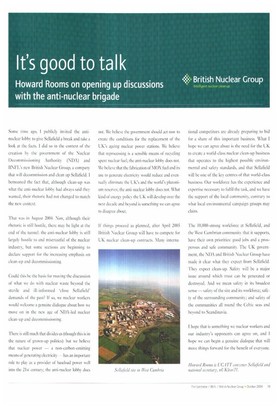It's good to talk
Howard Rooms on opening up discussions with the anti-nuclear brigade
Some time ago, I publicly invited the antinuclear lobby to give Sel'afield a break and take a look at the facts. I did so in the context of the creation by the government of the Nuclear Decommissioning Authority (NDA) and BNITL's new British Nuclear Group, a company that will decommission and clean up Se].Meld. I bemoaned the fact that, although clean-up was what the anti-nuclear lobby had always said they wanted, their rhetoric had not changed to match the new context.
That was in .August 2004. Now, although their rhetoric is still hostile, there may be light at the end of the tunnel: the anti-nuclear lobby is still Largely hostile to and mistrustful of the nuclear industry, but some sections are beginning to declare support for the increasing emphasis on clean-up and decommissioning.
Could this be the basis for moving the discussion of what we do with nuclear waste beyond the sterile and ill-informed 'close Scl demands of the past? If so, we nuclear workers would welcome a genuine dialogue about how we move on in the new age of NDA-led nuclear clean-up and decommissioning.
There is still much that divides us (though this is in the nature of grown-up politics): but we believe that nuclear power — a non-carbon-emitting means of generating electricity — has an important role to play as a provider of baseload power well into the 21st century; the anti-nuclear lobby does not. We believe the government should act now to create the conditions for the replacement of the UK's ageing nuclear power stations, We believe that reprocessing is a sensible means of recycling spent nuclear fuel; the anti-nuclear lobby does not. We believe that the fabrication of MaX Ind and its use to generate electricity would reduce and eventually eliminate the UK's and the world's plutonium reserves; the anti-nuclear lobby does not. What kind of energy policy the UK will develop over the next decade and beyond is something we can agree to disagree about.
things proceed as planned, after April 2005 British Nuclear Group will have to compete for UK nuclear clean-up contracts. Many interna
tional competitors are already preparing to bid for a share of this important business. What I hope we can agree about is the need for the UK to create a world-class nuclear clean-up business that operates to the highest possible environmental and safety standards, and that Sellafield will be one of the key centres of that world-class business. Our workforce has the experience and expertise necessary to fulfil the task, and we have the support of the local communit■, contrary to what local environmental campaign groups may claim.
The I0,000-strong workforce at Sellatield, and the West Cumbrian community that it supports, have their own priorities: good jobs and a prosperous and safe community. The UK government, the NDA and British Nuclear Group have made it clear what they expect from Sellafield. They expect clean-up. Safety will be a major issue around which trust can be generated or destroyed. And we mean safety in its broadest sense — safety of the site and its workforce; safety of the surrounding community; and safety of the communities all round the Celtic seas and beyond to Scandinavia.
I hope that is something we nuclear workers and our industry's opponents can agree on, and 1 hope we can begin a genuine dialogue that will move things forward for the benefit of everyone.
Howard Rooms is UCATT convener Sellafield and national secretary, nUKlear21.


















































































































 Previous page
Previous page